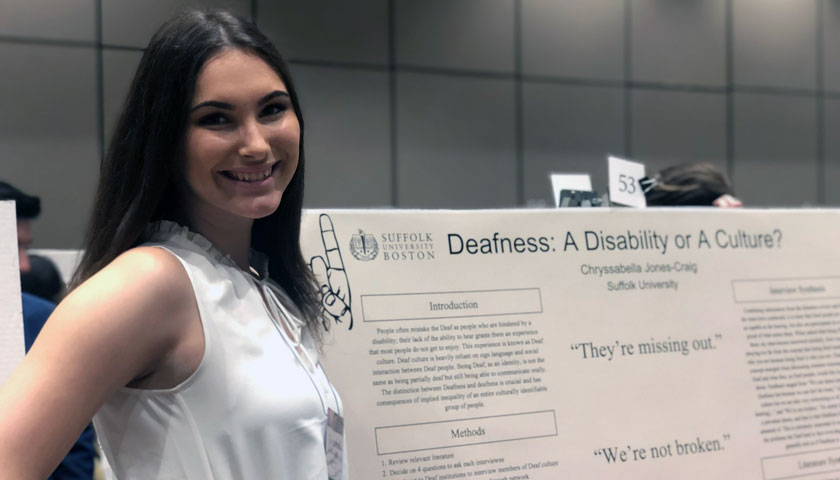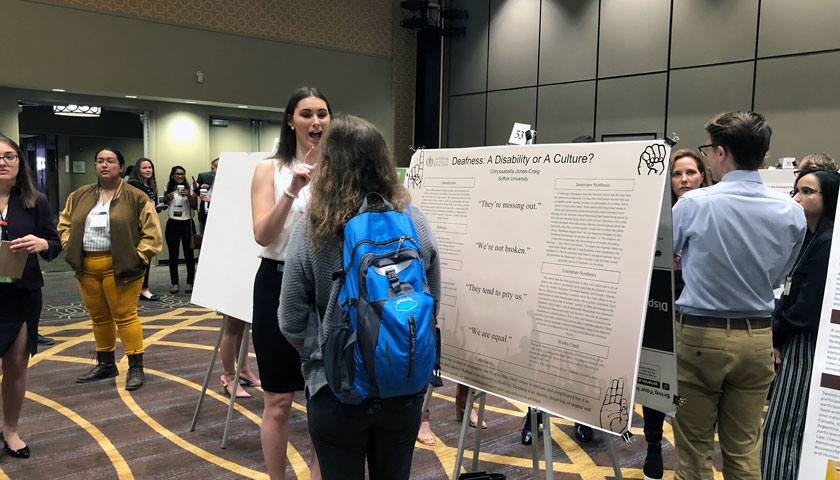Personal Experiences Drive Projects

As the hearing child of Deaf parents, Chryssabella Jones-Craig often was thrust into the role of family communicator. In time she realized that adults relying on her to translate for her parents in sensitive situations like parent/teacher conferences was problematic. Now the undergraduate law major is using her voice—and research skills—to advocate for the Deaf Community.
“I see myself as someone who is putting in the effort to bridge the gap between the Deaf world and the hearing world,” she says.
Through several interviews with Deaf people, she gathered qualitative data on the characteristics of their unique culture, their perception of hearing-people’s biases, and the challenges they face in everyday situations.
Jones-Craig was one of 13 College of Arts and Sciences honors students to present their research this fall at the National Collegiate Honors Council’s annual conference in New Orleans. In many instances it was the student’s first opportunity to conduct and present independent projects.

Hooked on Research
Not long ago Isis Garcia-Rodriguez, Class of 2019 was in their shoes, presenting her own research for the first time at the National Collegiate Honors Council conference. That work on immigrant families sparked a love of research that led her to pursue a PhD in counseling psychology at Virginia Commonwealth University.
She returned to the conference this year to talk about her work as the recipient of the Portz Scholar Award for her senior thesis, “Legal Status Effects on Parent-Child Relationships and Parent Well-Being.”
Like Jones-Craig, she has a particular connection with her work.
“The reason I study legal status and families is because it affects me personally. I want to support my community and give them tools,” she says.
When an adviser in the Suffolk Honors Program encouraged Garcia-Rodriguez to apply for a Portz Fellowship to fund her research project, she realized she would have to prepare “essentially a mini grant proposal.” She sought help from her professors and persisted, securing the fellowship while learning a new skill that would prove useful in her future career.
Now Garcia-Rodriguez uses the collaborative approaches she learned working with her mentors at Suffolk in her doctoral research and while mentoring undergraduates. She encourages students to ask questions and reach out for help.
“Coming from a first generation Latinx status there were a lot of things I didn’t know,” she says. “Asking questions opened doors for me.”
Conference connections
Jones-Craig enjoyed presenting her findings at the conference. Her poster featured prominent quotes from her subjects, things they wanted hearing people to know, including: “We’re not broken” and “They’re missing out” by dismissing Deaf people and culture. These started conversations and led to one special interaction with a Deaf attendee who said he “appreciated the break” of being able to talk to Jones-Craig using American Sign Language.
She also had the chance to discuss research planning with Garcia-Rodriguez:
“I talked with Isis about what I want to do next year, potentially connecting the topic with my law major to look at accessibility in the court system. We realized there is overlap in our two research areas because those language barriers impact both the Deaf and immigrant communities.”



